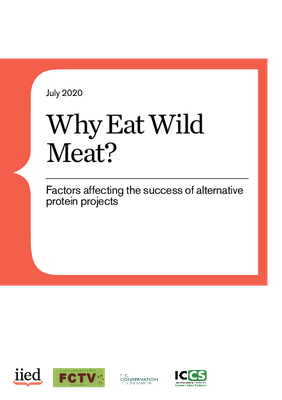Why eat wild meat? Factors affecting the success of alternative protein projects
Hunting wildlife for meat widely practiced in sub-Saharan Africa (SSA) but also widely understood to be unsustainable in many countries. This threatens both biodiversity conservation and food security. As a result, many NGOs and government bodies have undertaken wild meat ‘alternatives projects’, including those that aim to provide alternative protein sources, for example, through captive rearing of wild species. However, there are limitations to the assumptions that underpin these projects, and limited evidence of their effectiveness. This report presents initial findings from online surveys and a review of project reports and websites conducted to explore the factors affecting the success of alternative protein projects across SSA, with a focus on Cameroon and the Dja Faunal Reserve in particular.
https://biodiversitylinks.org/learning-evidence/wild-meat-collaborative-learning-group/evidence-collection/evidence-inbox/why-eat-wild-meat.pdf/view
https://biodiversitylinks.org/learning-evidence/wild-meat-collaborative-learning-group/evidence-collection/evidence-inbox/why-eat-wild-meat.pdf/@@download/image/image.png
File
Why eat wild meat? Factors affecting the success of alternative protein projects
Author(s):
Booker, Francesca
,
Wilson-Holt, Olivia
Publication Date: 2020
Location: Africa
DOWNLOAD FILE
Hunting wildlife for meat widely practiced in sub-Saharan Africa (SSA) but also widely understood to be unsustainable in many countries. This threatens both biodiversity conservation and food security. As a result, many NGOs and government bodies have undertaken wild meat ‘alternatives projects’, including those that aim to provide alternative protein sources, for example, through captive rearing of wild species. However, there are limitations to the assumptions that underpin these projects, and limited evidence of their effectiveness. This report presents initial findings from online surveys and a review of project reports and websites conducted to explore the factors affecting the success of alternative protein projects across SSA, with a focus on Cameroon and the Dja Faunal Reserve in particular.


